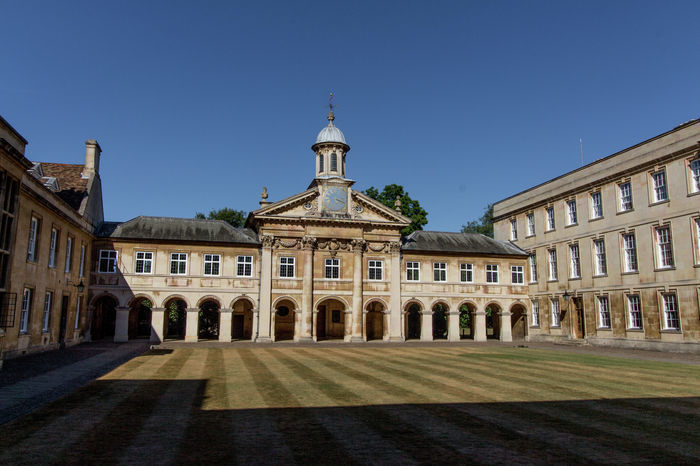2019/20 Senior Academic promotions favour men by almost 300%
Almost three times as many men as women were promoted to professorships, with Varsity only aware of one new BAME professor elevated

The latest round of Senior Academic promotions, coming into effect in October 2020, reveal that men have been elevated almost three times more than women.
The list, reported in The Cambridge University Reporter on the 24th of June, gives the names of those members of staff being promoted to professorships and senior reader positions.
Of the 42 new professorships 11 are women, and Varsity is only aware of one BAME individual promoted to this level.
These inequalities are particularly pronounced in STEM subjects. The School of Technology will be promoting ten members of staff to professorship, and amongst this cohort there will be only one new female professor.
Likewise, only two of the nine promotions in the School of Physical science were awarded to female staff, and only one out of five in the School of Biological Sciences.
Only the School of Arts and Humanities had equal gender representation in its promotions, promoting five male and female staff amongst its faculties.
Responding to a Varsity comment request, a University spokesperson said “the University of Cambridge is committed to providing a supportive environment to enable individuals to take ownership of their development and build a successful career at Cambridge.”
“The University’s success depends on the diversity of its staff and students and it aims to be a leader in fostering equality and inclusion and nurturing a sense of belonging for all within our community.”
Of BAME individuals promoted to professorships, Varsity is only aware of the elevation Dr. Priyamvada Gopal. Dr. Gopal has recently been the subject of harassment as a result of her activity on Twitter, incidents which led the University to tweet in support of the freedom of speech of it’s academics.
A University statement described that “this promotions round did promote BAME staff across all three categories (Senior Lecturer, Reader and Professor) of staff”, however a spokesperson told Varsity that due to GDPR constraints they were unable to provide more specific information on this.
The statement also went to say that “this promotion round did promote proportionally in relation to the number of applicants received from men and women.”
“Of the 118 successful applicants 69.5% were men and 30.5% were women. The applications totalled 171 of which 69.5% were men and 30.5% women (i.e same % as successful) this in line with the number of academics who are women within the institution (31% women academics as of March 2020)."
They also furthered that “as an institution we are aware that we need to do more to support the promotion of BAME staff” with “increasing the representation of BAME staff in senior committee membership” a “key factor” in “ensuring that Heads of Institutions proactively encourage and support BAME staff to apply for promotion.”
The inequality that the recent promotions reveal is in line with historical trends within the University. The ‘2018-19 Equality and Diversity Information Report’, the most recent diversity information available published in January 2019, reports that ‘in March 2019 29.9% of Academic staff at the University were women, below the average percentage for Russell Group institutions’.
‘They [women] comprised 37.2% of University lecturers, 33.6% of Senior Lecturers and 28.7% of Readers. 21.4% of Professors were women, an increase from 18.0% in 2017’. In 2019 there were 145 female professors within the University.
The report also paints a similar picture for BAME academic staff. Although ‘the proportion of staff who have declared they are BAME has risen over the last four years’ out of the 87.1% of staff who disclosed their ethnicity only 13% identified as BAME. The report did not offer any information on the proportion of BAME professors, but did record that of 1,522 academic staff, only 187 identified as BAME.
When questioned as to what was being done to redress these issues, a University spokesperson told Varsity that “the University in its next promotion round will be implementing a new scheme - Academic Career Pathways (ACP) which has been devised in order to ensure greater transparency in the promotions process.”
“There is specific guidance for Heads of Institution who play a key role in ensuring that staff from under represented groups are supported and encouraged to be ready to apply for promotions; to actively support under-represented staff and actively help find a mentor; and discuss promotion/progression pathways with under-represented staff not yet ready for promotion in order to make sure that support is in place.”
The plan to implement ACP, as well as details of other plans to improve racial equality through transparency and “an increase in white staff’s perceptions that race matters are relevant to them”, are laid out in the University’s Race Equality Action Plan.
 Features / Should I stay or should I go? Cambridge students and alumni reflect on how their memories stay with them15 December 2025
Features / Should I stay or should I go? Cambridge students and alumni reflect on how their memories stay with them15 December 2025 News / Cambridge study finds students learn better with notes than AI13 December 2025
News / Cambridge study finds students learn better with notes than AI13 December 2025 News / Dons warn PM about Vet School closure16 December 2025
News / Dons warn PM about Vet School closure16 December 2025 Comment / The magic of an eight-week term15 December 2025
Comment / The magic of an eight-week term15 December 2025 News / News In Brief: Michaelmas marriages, monogamous mammals, and messaging manipulation15 December 2025
News / News In Brief: Michaelmas marriages, monogamous mammals, and messaging manipulation15 December 2025









